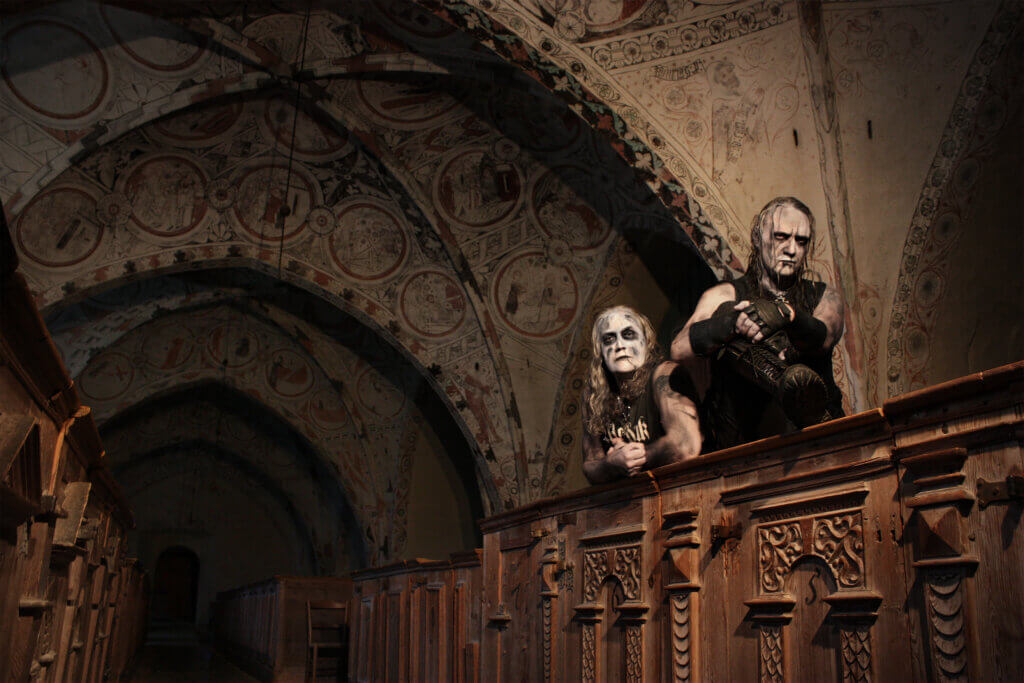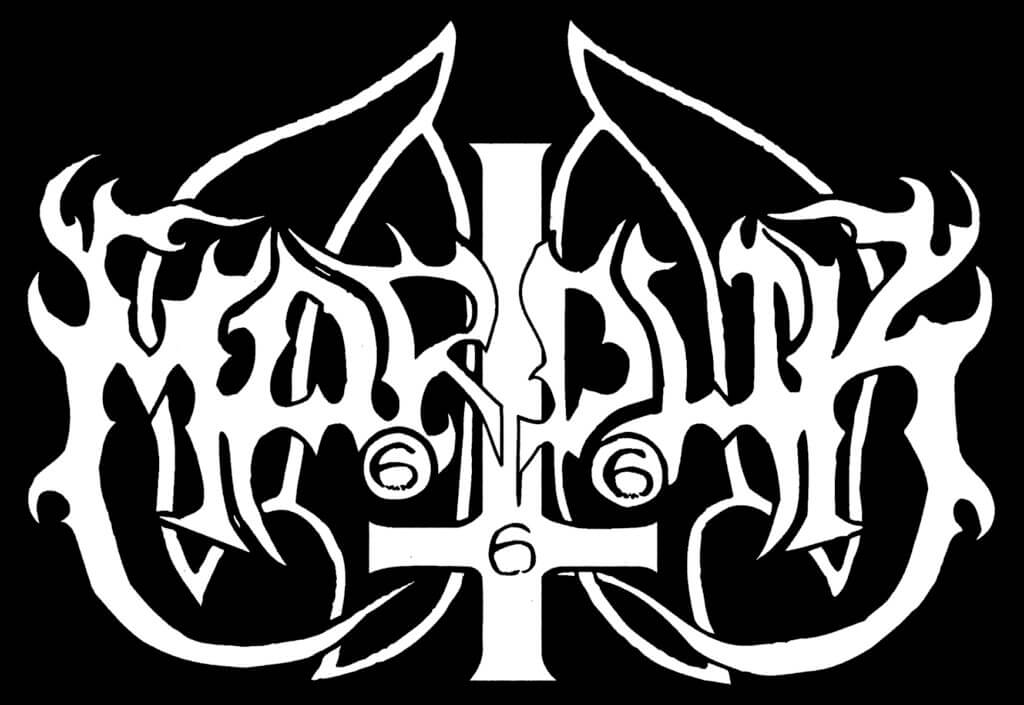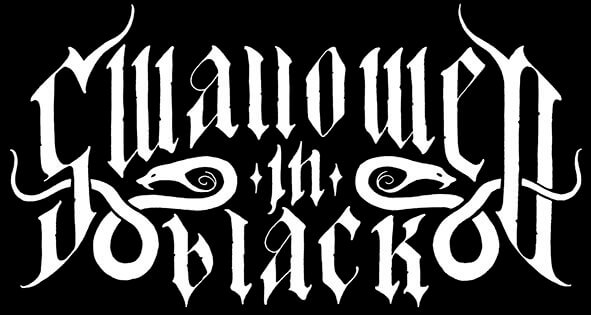“THE REAL WORLD IS DARK ENOUGH, GRIM ENOUGH, AND TWISTED ENOUGH TO SATISFY OUR MORBID DESIRES WITH RELATIVE EASE” – DANIEL ROSTÉN (MARDUK)
Has it dawned on you yet? Have you begun to grasp that life is not a clock, but an hourglass? Grounded in reality and true, unavoidable horrors that will rattle us all, rather than fantastic, hypothetical or paranormal musings, Marduk’s pitch-black 15th full-length homily to death and dying, ‘Memento Mori’, is an uncannily disturbing and profound listening experience that echoes, reverberates and torments the mind long after the record stops spinning on the platter. Nothing hits closer to home than the terrible transience of time and the certainty that every one of us is but a doomed monument to decay, inescapably dying from the moment we are born. Deep-thinking death dealer and darkness dweller Daniel Rostén – accursed focal point of the panzer division offensive for 21 years, seven albums and untold world conquests – ponders the convictions and circumstances that prompted him to conceive this dark, maggot-strewn, funereal work of art, and elucidates the poignant, powerful and painful participation from beyond the grave of legendary, immortalised torchbearer LG Petrov.
 ‘Memento Mori’ is both a musical and lyrical triumph, vividly depicting a macabre medley of death and decay. What inspired you to compose this morbid masterpiece? Are you becoming more aware of the sands of time slipping through your fingers as you get older?
‘Memento Mori’ is both a musical and lyrical triumph, vividly depicting a macabre medley of death and decay. What inspired you to compose this morbid masterpiece? Are you becoming more aware of the sands of time slipping through your fingers as you get older?
“‘Memento Mori’ – remember that you must die! A reminder meant for us all, young and old alike. And yes, there is no denying that death grows more tangible as the seasons turn, as it, needless to say, lies in the most basic nature of things.
“Those not completely ignorant of significant history know, of course, that this topic has inspired and enchanted not only us, but the entire genre since its very infancy. What made this time different, however, was that early on in the creative process, we made it our steadfast mission not only to honour, but to renew and improve this old, well-established concept by truly boiling it down to its purest form, refining it into its most potent concentrate possible; ultimately capturing its true essence… More is more, right?
“A few impurities can still be found in the final product though. Take, for example, ‘Year of the Maggot’, where a couple of carefully selected historical figures are placed at the forefront as – let’s say – decoys; but even here, death and decay remain the true protagonists. Another example: ‘Charlatan’, where more traditional Black Metal tools are being wielded, even if with a twist or two. These impurities were, of course, left there intentionally — mainly as seasoning or a splash of colour, to keep those with shorter attention spans around for perhaps yet another lesson they so desperately need.
“As for influences, I suppose a nod to the 16th– and 17th-century priesthood is in order, as they more or less laid the groundwork for the tone we’re now trying to set with this album. But what really inspired me? I guess… Death.”
 To what extent is ‘Memento Mori’ a wake-up call? Could the sobering realisation that life is an hourglass and our days are numbered serve as a timely reminder that we should live life to the full while we still can?
To what extent is ‘Memento Mori’ a wake-up call? Could the sobering realisation that life is an hourglass and our days are numbered serve as a timely reminder that we should live life to the full while we still can?
“A question overlooked by most — yet hard to unsee once found… Could it be? Is ‘Memento Mori’, as you so brazenly suggest, merely a darker shade of the life-affirming Carpe Diem — or something far more sinister? Or perhaps both? All things considered, something best left to the listener to ponder on their own while navigating the album’s lyrical realm.”
‘Memento Mori’ strikes close to the bone as the themes covered are so relevant to the human condition. Relating true horrors – be it war, religion, history or death – Marduk’s art has always explored real issues and events. Truth beats fiction?
“Imaginary worlds don’t do much for me these days — in fact, they never have. Nor have they ever been much of a refuge for the other members of Marduk as far as I know, be it past or present, even if a mere glance at our albums, live shows, or overall aesthetics might suggest otherwise. But no, the real world is dark enough, grim enough, and twisted enough to satisfy our morbid desires with relative ease.
“That said, I have no issue with borrowing from fictional domains if it serves a metaphorical or symbolic purpose though, be it from popular culture, folklore, or the holy book itself. In fact, I do it myself all the time — though more frequently in my other ensembles than in Marduk, where I feel such usage can greatly sharpen, deepen, or add theological gravitas to a message or a vision. But just plain make-believe? I’ll leave that to others.
“Those familiar with my other projects know, of course, that the Bible has typically been my weapon of choice when entering these arenas — for reasons I’ll save for another time. But it does leave us with an interesting and far more urgent question: Word of God, or just another fantasy novel?”  Rather than slowing pace or basking in the glow of past glories, Marduk keeps marching ominously onwards, expanding energetically upon a peerless legacy. What insatiable hunger drives this relentless forward march and are you still as passionate about creating and performing Black Metal as you were when you started out?
Rather than slowing pace or basking in the glow of past glories, Marduk keeps marching ominously onwards, expanding energetically upon a peerless legacy. What insatiable hunger drives this relentless forward march and are you still as passionate about creating and performing Black Metal as you were when you started out?
“I’ve never really understood why so many artists — especially musicians, it seems — tend to slow down or lose inspiration, passion, or drive after a certain number of years in the field, while I myself, if anything, feel as if I’m moving in the completely opposite direction — constantly contemplating new riffs, lyrics, layout ideas and what not. In fact, it’s the opposite that can sometimes be a bit of a problem – to stop ruminating on these matters day in and day out, to stop answering every single call from the relentless muses hovering around my writing chamber. So yes, to say that we’re still passionate about our craft would be an understatement.
“Sure, the focus points may have shifted somewhat over the years, but the hunger itself has burned with undiminished intensity for as long as I can remember — and shows no sign of waning whatsoever. I suppose I shouldn’t question it too much, and just go with the flow… or at least keep pushing until something vital breaks.”
 ‘Memento Mori’ climaxes with the eerily unsettling ‘As We Are’, a profound and powerful denouement poignantly graced with fleeting backing vocals from LG Petrov, who had sadly passed away before the album was recorded or released. How much does it mean to you to have LG’s iconic voice immortalised on the record and can you provide any further insight into the circumstances surrounding this brilliant but bittersweet collaboration?
‘Memento Mori’ climaxes with the eerily unsettling ‘As We Are’, a profound and powerful denouement poignantly graced with fleeting backing vocals from LG Petrov, who had sadly passed away before the album was recorded or released. How much does it mean to you to have LG’s iconic voice immortalised on the record and can you provide any further insight into the circumstances surrounding this brilliant but bittersweet collaboration?
“As you are… we once were. As we are… so shall you be! This part… the LG part… was actually not only the first thing to be recorded for ‘Memento Mori’, but also the first substantial idea I had for the album — having saved those particular lines for quite some time, years probably, before even deciding on this particular album’s overall concept. One could even say that these lines were what sparked the idea of an album entirely dedicated to the concept of death and dying in the first place.
“The lines in question are of the borrowed kind, and can be traced back mainly to medieval England — and to the legend of the Three Living and the Three Dead, where three nobles, out hunting, encounter three corpses in various stages of decay, who proceed to educate them on the fragility of life and the certainty of death. In other words: a perfect addition to an album built around the creed of Memento Mori.
“And with LG’s condition slowly but surely worsening, my artistic, and perhaps slightly twisted mind couldn’t help but wonder: what if he wouldn’t make it — which, by then, we all more or less knew was inevitable. Wouldn’t these lines reach their ultimate impact if we could get LG to — if not sing — then at least speak them, before ultimately facing his demise? And with that, granting the message its ultimate form by having it delivered directly from its natural habitat — from beyond the grave. But surely, one cannot ask this of someone in his position — let alone, how do you even bring it up?
“But then, sometime towards the end of his final battle, I too found myself in a hospital bed. Nothing serious, or even remotely close to the tribulations he was facing of course — just a fairly routine surgery due to a stubborn back injury. But it got me thinking: what if it were I lying there waiting to perish? Wouldn’t I want this final opportunity to practise my craft — and, at the same time, lecture the world on this uncomfortable yet undeniable and increasingly relevant truth? The answer was simple, and I immediately brought it up. LG, the torchbearer that he was, of course loved the idea — and shortly after, I brought over my mobile recording equipment to bring this now fully formed vision into reality.
“The state of his voice was a concern though, as it had been severely weakened — not only by the disease itself, but also by the sheer multitude of medications they had pumped into him. Still, we both agreed that the task ahead was greater than the actual audible result, and after some tempering of the sound files, I believe we arrived at something worthy of both the intended album and his legacy alike.
“And so, in the midst of this great loss, a tiny yet important victory was found: the song in question was granted an enhanced and unique depth rarely seen before. LG cemented himself as the most iconic figure in the history of Metal, and the Three Dead got their message carried across time and delivered anew. But the real winners? The fans of Marduk and Entombed — or, dare I say, the fans of Black and Death Metal.”
 Although Marduk has arguably transcended the Black Metal underground (in terms of popularity), your art remains imbued with a very strong DIY ethic. How important is it to stay true to your roots and to identify with the underground spirit that spawned Black Metal in the first place?
Although Marduk has arguably transcended the Black Metal underground (in terms of popularity), your art remains imbued with a very strong DIY ethic. How important is it to stay true to your roots and to identify with the underground spirit that spawned Black Metal in the first place?
“A persistent dilemma as old as the genre itself… On the one hand, the traditionalist branch, with its long-established canon and fixed yet lethal formulas; on the other, the unorthodox and more experimental one, constantly seeking new territories to explore and conquer… A trivial, and for the most part harmless rivalry, of course, but still a dividing line that more often than not leads to debate.
“Fact is, that we need them both… the former, as the default foundation to build upon — the anchor to prevent us from drifting too far from the genre’s perhaps narrow but vital identity. The latter, to craft new potent potions and effective weaponry for the collective arsenal — to keep the art form as vibrant and dynamic as can be, without branching out too far from its defining roots, and to, perhaps above all, prevent stagnation and the descent into oblivion that is bound to follow.
“As for my own work, the more vigilant observers have, of course, not failed to notice that I have a foot in both of the aforementioned schools of thought — the more classical and traditional when creating for Marduk, obviously, and the more experimental when working with my other project, Funeral Mist, where pushing boundaries and breaking rules is more the rule than the exception.
“However, the more I contemplate this question, the more I realize that I probably am somewhat divided myself — with one part of me deeming these matters important and highly interesting, even if more so in terms of human psychology than musical direction. And the other part of me again and again arriving at the same conclusion: Who cares? Do what you want…”
 On ‘Memento Mori’, you accepted primary song-writing duties in Marduk for the first time. Bearing in mind this added responsibility, is it unavoidable that some sounds or ideas that might otherwise have found their way onto a Funeral Mist recording could be inadvertently assimilated into Marduk, or is there still enough unholy inspiration in the creative well to ensure that both can continue to flourish simultaneously?
On ‘Memento Mori’, you accepted primary song-writing duties in Marduk for the first time. Bearing in mind this added responsibility, is it unavoidable that some sounds or ideas that might otherwise have found their way onto a Funeral Mist recording could be inadvertently assimilated into Marduk, or is there still enough unholy inspiration in the creative well to ensure that both can continue to flourish simultaneously?
“That’s not really the case though, as I’ve in fact written a fair share of both music and lyrics for every Marduk album since my induction into the band in 2004, around the ‘Plague Angel’ era. Most of the lyrics, of course — being the vocalist and all — but also a significant portion of the music, even half, if not more, on some releases such as ‘Wormwood’ and ‘Frontschwein’, and perhaps somewhere between two and four songs on each of the remaining ones.
“Your confusion is understandable though — many have fallen for the same misconception over the years. A natural result, I suppose, of us generally crediting the entire band as songwriters rather than naming specific members.
“That being said… creative overlap between the projects is generally not a concern. Of course, it happens from time to time — that certain material, originally intended for one band, for whatever reason ends up with the other. But for the most part, these things tend to find their rightful homes naturally, simply by adopting one specific mindset when composing for Marduk, and another when working with Funeral Mist.
“As for my sources of inspiration being in danger of becoming depleted or not, I can assure you… the wells in question are, as previously stated, still brimming with enough zeal and creative fuel to keep both fires raging for many years to come — or at least until something vital breaks.”
Photo credits: Håkan Sjödin (hourglass, shovels, Marduk); RR (guitar); Hrafn (Daniel and Morgan); Devo Andersson (mic)

